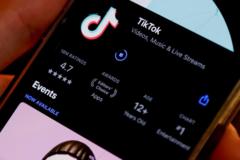**As legal battles ensue over TikTok's future in the U.S., Trump's potential reprieve may offer temporary relief but raises questions about data privacy and national security.**
**Trump Signals Possible 90-Day Stay on TikTok Ban Amid Rising Tensions**

**Trump Signals Possible 90-Day Stay on TikTok Ban Amid Rising Tensions**
**Former President hints at leniency for TikTok as digital creators voice concerns over potential app shutdown.**
In a pivotal communication, Donald Trump indicated he would "most likely" authorize a 90-day reprieve for TikTok before the application encounters a ban due on Sunday, coinciding with his inauguration as the 47th US president. Trump revealed to NBC News that a formal announcement regarding the ban's potential extension is anticipated on Monday, following his swearing-in ceremony.
The controversy heightens as TikTok's warning of a possible "darkness" on Sunday looms over the app's fate, requesting clarity from the outgoing Biden administration about the ban's enforcement. Meanwhile, the Supreme Court ruled on Friday in favor of the existing law that mandates TikTok's parent company, ByteDance, to divest from the app by January 19, a stipulation ByteDance has so far refused to comply with.
As tensions mount, TikTok expressed frustration over the lack of assurances from the White House and the Department of Justice, which they claimed is essential for maintaining the app's accessibility. Presidential spokesperson Karine Jean-Pierre countered on Saturday, dubbing TikTok's last-minute warnings as merely "a stunt" and confirmed that the responsibility to address the situation will transfer to Trump once he assumes office.
In discussions with Chinese President Xi Jinping, Trump mentioned the TikTok situation among other international concerns. TikTok's CEO, Shou Zi Chew, is expected to attend Trump's inauguration, highlighting the intersection of politics and digital media in today's environment.
US national security officials have voiced apprehensions that the app could be exploited by Chinese intelligence to track American individuals and federal employees—a claim TikTok has consistently denied. The Chinese embassy responded with criticism, accusing the United States of unjustly targeting TikTok, and pledged to protect its legitimate interests.
At present, TikTok boasts a significant following, claiming 170 million users in the US, many of whom have mobilized to urge Congress against the impending ban. The platform has served as a crucial avenue for political outreach, especially to younger demographics.
While Trump has previously supported the notion of a TikTok ban, he appears to have softened his stance, acknowledging the "warm spot" he has for the app given his campaign accomplishments. Under legislation enacted last April, the closure of the US version of TikTok could soon occur, severely impacting content creators and small business owners reliant on the app for income—a sentiment echoed by fashion designer Nicole Bloomgarden, emphasizing the app's significance to her livelihood.
Reflecting on similar global actions, such as India's decision to ban TikTok in 2020, industry experts speculate on how a US ban could reshape the digital landscape, potentially benefiting rival platforms like Instagram Reels and YouTube Shorts.
Although TikTok's warning of "going dark" remains uncertain without government intervention, creators can only hope for a temporary reprieve as the digital debate unfolds.
The controversy heightens as TikTok's warning of a possible "darkness" on Sunday looms over the app's fate, requesting clarity from the outgoing Biden administration about the ban's enforcement. Meanwhile, the Supreme Court ruled on Friday in favor of the existing law that mandates TikTok's parent company, ByteDance, to divest from the app by January 19, a stipulation ByteDance has so far refused to comply with.
As tensions mount, TikTok expressed frustration over the lack of assurances from the White House and the Department of Justice, which they claimed is essential for maintaining the app's accessibility. Presidential spokesperson Karine Jean-Pierre countered on Saturday, dubbing TikTok's last-minute warnings as merely "a stunt" and confirmed that the responsibility to address the situation will transfer to Trump once he assumes office.
In discussions with Chinese President Xi Jinping, Trump mentioned the TikTok situation among other international concerns. TikTok's CEO, Shou Zi Chew, is expected to attend Trump's inauguration, highlighting the intersection of politics and digital media in today's environment.
US national security officials have voiced apprehensions that the app could be exploited by Chinese intelligence to track American individuals and federal employees—a claim TikTok has consistently denied. The Chinese embassy responded with criticism, accusing the United States of unjustly targeting TikTok, and pledged to protect its legitimate interests.
At present, TikTok boasts a significant following, claiming 170 million users in the US, many of whom have mobilized to urge Congress against the impending ban. The platform has served as a crucial avenue for political outreach, especially to younger demographics.
While Trump has previously supported the notion of a TikTok ban, he appears to have softened his stance, acknowledging the "warm spot" he has for the app given his campaign accomplishments. Under legislation enacted last April, the closure of the US version of TikTok could soon occur, severely impacting content creators and small business owners reliant on the app for income—a sentiment echoed by fashion designer Nicole Bloomgarden, emphasizing the app's significance to her livelihood.
Reflecting on similar global actions, such as India's decision to ban TikTok in 2020, industry experts speculate on how a US ban could reshape the digital landscape, potentially benefiting rival platforms like Instagram Reels and YouTube Shorts.
Although TikTok's warning of "going dark" remains uncertain without government intervention, creators can only hope for a temporary reprieve as the digital debate unfolds.






















